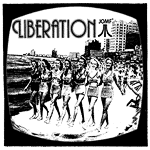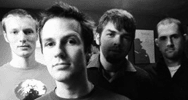 |
 |
|
|
|
| |||
 Jackie-O Motherfucker
Jackie-O MotherfuckerLiberation [Road Cone; 2001] Rating: 8.0 The late French historian Ferdinand Braudel demanded that history be written in the longue duree. History's typical subject matter, politics and war, were but weather fluttering above the passage of a deeper time-- the time of soil and seas, the rise and fall of populations, the global transit of diseases, the expansion of economies. Beneath the speeches and explosions, history creeps along in the long span; perhaps it was all slower than anyone might have imagined. Though bound to the seventy-five minute surface of a compact disc, Portland's Jackie-O Motherfucker have discovered the secret of making music in the longue duree. Masterminds Jef Brown and Tom Greenwood, along with the platoon of weirdo outrock soldiers of fortune with whom they surround themselves, have been crafting the perfect antithesis to the millennial strain of gloomy post-rock, a genre dominated by the likes of Mogwai, Godspeed You Black Emperor!, and the lately touted Explosions in the Sky. Against the ubiquitous music of crisis, Jackie-O has managed to make a very serious case for the music of continuity. Its sheer joy and wonder reside neither in tension nor resolve, neither verse nor chorus, but simply in dogged perseverance. Last year's breathtaking Fig. 5 unfolded in the deep time of the American musical past. The album simply eroded the strata of one musical epoch after another, as if beneath it all there was some secret to be disinterred. The dusty x-ray on that record's cover served as the perfect manifesto for the album: underneath all this, somewhere there must be bone, a frame and foundation that holds it all together. Liberation has no such quest; it is rivery and meandering, with no discernible source or mouth. Liberation simply travels, picking up junk and jetsam along the way, discarding it somewhere downstream, and rambling on. Beginning somewhat arbitrarily with the clatter of "Peace on Earth," one gets the distinct feeling of having suddenly and for no apparent reason been made privy to the secret sound of everyday life. Drums tap out a hesitant shuffle. The plaintive vibraphone chatters brightly. The strings drone and yawn as if they were the innards of some great machine that makes everything turn. The guitars enter into the fray, commanding some sense of direction, but to little avail. One might compare the proceedings to the drone jams of Spacemen 3's Dreamweapon; both render dissonance rather precarious-- as if a song could emerge from the noise at any minute. But "Peace on Earth" never really resolves into a stable entity. After ten minutes, "Peace" simply shuts the door on the listener, as if never meant to be heard. The similarly lengthy "Ray-O-Graph" owes much to the dreary Celtic fog perfected by the Dirty Three. Above the programmed drizzle of the drum track, the guitar and strings manage to recreate the seasick interplay of Mick Turner and Warren Ellis. Jackie-O Motherfucker add squiggly sound effects and softly squawking horns to the mix, giving the track a kind of drunken stagger. The twanging "Northern Line" sets the sweet voice of Jocelyn Goldsmith above the throbbing backporch Americana that dominated Fig. 5, serving as a transitional piece in much the same way as the similarly lilting "Beautiful September" did on the previous album. The twenty-minute "In Between" cycles like seasons through sparse, wintry branches of bare guitar and lush passages of noise in full bloom. The fierce and nimble free improv drumming is easily the track's strongest suit; they're recklessly creative even when the guitar minimalism grows somewhat tiresome. As an exercise in patience, the first ten minutes of "In Between" is masterful; but musically, the point is made early on and is barely expanded upon. The second half, however, erupts into backwater freakout, bleeding the thin twang into thick distortion like some confederate Sonic Youth. The subtle and engaging "Pray" intertwines a spare and beautiful guitar line in slithering electronics. Vibes, organ and several guitars slowly begin to flesh out the sound, transforming skeletal country into irresistibly creepy psychedelia on the order of Popol Vuh. The guitars skitter off into mock-sitar, sax crows in the corner, yet the restraint and economy of "Pray" is almost saintly. There is a stubborn lag to Liberation that some will no doubt find infuriating. Lacking the focus and narrative of Fig. 5, Liberation occasionally plays like molasses. But the album is nonetheless beautiful, for the consistently amazing quality of Jackie-O Motherfucker is their ability to color experimental music and noise with more candor and emotional sophistication than most turtlenecked troubadours. But it takes time. And time might just be the instrument played with the most brilliance on Liberation: sped up, slowed to a crawl, made to stand dead still and maybe even at times, dismissed. The stereo display times this album at seventy-three earthly minutes, but I'm not quite sure how long the music has really been around. Seems like ages. -Brent S. Sirota, December 11th, 2001
|
|||

